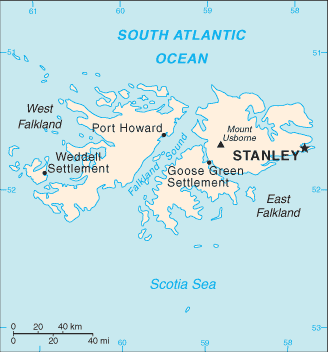Port Howard: Difference between revisions
MacRusgail (talk | contribs) mNo edit summary |
MacRusgail (talk | contribs) |
||
| Line 14: | Line 14: | ||
Port Howard was founded by James Lovegrove Waldron, and his brother in 1866; the Waldron brothers later left for [[Patagonia]], but left the far under local management. In 1986, it was bought by Robin and Rodney Lee, who let the local population buy shares. <ref name=Wigglesworth>Wigglesworth, Angela. (1992) ''Falkland People''. Pub. Peter Owen. ISBN 0-7206-0850-3</ref> |
Port Howard was founded by James Lovegrove Waldron, and his brother in 1866; the Waldron brothers later left for [[Patagonia]], but left the far under local management. In 1986, it was bought by Robin and Rodney Lee, who let the local population buy shares. <ref name=Wigglesworth>Wigglesworth, Angela. (1992) ''Falkland People''. Pub. Peter Owen. ISBN 0-7206-0850-3</ref> |
||
During the [[Falklands War]], the settlement was occupied by around 1,000 troops. A small museum has been set up, in a shed. It contains a number of items which Argentine troops left behind. Pinned to the wall, is a poem, ''[[Battle of Mount Tumbledown|Ode to Tumbledown]]'' which was written by an anonymous [[Scots Guard]]. <ref name=Wigglesworth>Wigglesworth, Angela. (1992) ''Falkland People''. Pub. Peter Owen. ISBN 0-7206-0850-3</ref> |
During the [[Falklands War]], the settlement was occupied by around 1,000 troops. A small museum has been set up, in a shed. It contains a number of items which Argentine troops left behind, including an ejector seat. Pinned to the wall, is a poem, ''[[Battle of Mount Tumbledown|Ode to Tumbledown]]'' which was written by an anonymous [[Scots Guard]]. <ref name=Wigglesworth>Wigglesworth, Angela. (1992) ''Falkland People''. Pub. Peter Owen. ISBN 0-7206-0850-3</ref> |
||
Up the hill is the grave of Captain John Hamilton. Unusually, the Argentines recognised his bravery, and allowed for a [[Union Jack]] to be placed on his coffin before burial. |
|||
==References== |
==References== |
||
Revision as of 13:33, 31 August 2007

Port Howard (Spanish/Argentine name: Puerto Mitre; sometimes Puerto Howard in Spanish) is the largest settlement on West Falkland (unless Fox Bay is taken as one settlement, instead of two).
Port Howard is the centre of a 200,000 acre (800 km²) sheep farm, with twenty permanent residents and over 42,000 sheep. Sometimes this population is doubled by transitory residents.
The settlement has two airstrips which receive regular flights from Stanley, and it is also destined to be the West Terminal of the new East-West Ferry. Over the past 15 years the Falkland Islands Government has built a network of all weather roads around East and West Falkland, Port Howard is at the Northern end of the West Falkland network. Attractions in the settlement include a golf course, a ford, large sheep shearing sheds, Mount Maria (part of the Hornby Mountains range). Many of the houses have attractive green roofs, and there are also a number of hedges about.
Every three years, Port Howard hosts the West Falklands Sports. This week-long celebration of the end of the shearing season combines serious horse-racing with other festivities.
The Warrah River and Chartres River are nearby fishing rivers.
History
Port Howard was founded by James Lovegrove Waldron, and his brother in 1866; the Waldron brothers later left for Patagonia, but left the far under local management. In 1986, it was bought by Robin and Rodney Lee, who let the local population buy shares. [1]
During the Falklands War, the settlement was occupied by around 1,000 troops. A small museum has been set up, in a shed. It contains a number of items which Argentine troops left behind, including an ejector seat. Pinned to the wall, is a poem, Ode to Tumbledown which was written by an anonymous Scots Guard. [1]
Up the hill is the grave of Captain John Hamilton. Unusually, the Argentines recognised his bravery, and allowed for a Union Jack to be placed on his coffin before burial.
